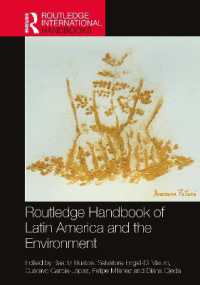- ホーム
- > 洋書
- > 英文書
- > Business / Economics
Full Description
In Computational Organizational Cognition, Davide Secchi presents an innovative definition of organizational cognition using a research tradition that builds on the Embodied/Distributed/Extended Cognition (EDEC) perspectives and it is developed through agent-based computational simulation modelling.
After an overview of EDEC perspectives, Computational Organizational Cognition presents four simulations which allow readers to clearly assess the advantages of agent-based computational organizational cognition (AOC) for both theory and practice. The book attempts to demonstrate how AOC is a useful if not essential instrument to explore, understand and analyze the inner complexities of organizational cognition. AOC is a powerful tool and an approach for organizational research enquiry at the service of both organizational scholars and cognitive scientists.
Contents
Chapter 1. IntroductionPART I. IN SEARCH FOR A THEORY OF ORGANIZATIONAL COGNITION
Chapter 2. Managerial and organizational cognition: what's not to like?
Chapter 3. Cognition outside the skull
Chapter 4. Extensions and criticism
Chapter 5. The social distribution of cognition
PART II. AGENT-BASED COMPUTATIONAL ORGANIZATIONAL COGNITION
Chapter 6. Agent-based modeling and cognition
Chapter 7. An unusual diffusion model
Chapter 8. The operational boundaries of docility
Chapter 9. Relaxing the assumptions
Chapter 10. Wild inquisitiveness: the plastic organization
PART III. THE LARGER PICTURE
Chapter 11. Understanding organizational cognition
Chapter 12. A new paradigm
Chapter 13. Final remarks: pushing the boundaries








